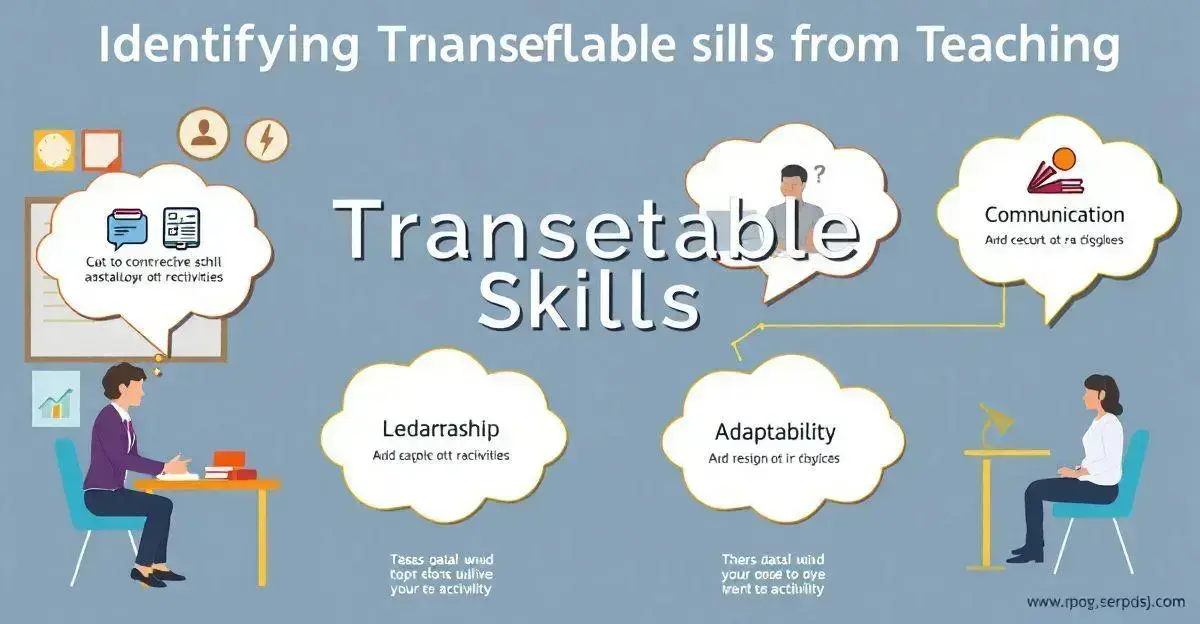A career change for teachers is becoming more common as educators look to apply their skills in new fields. Whether due to burnout or a desire for a change, many teachers are seeking opportunities outside the classroom. This shift can feel daunting, but it can also lead to rewarding new challenges.
Teachers bring valuable skills like communication, leadership, and problem-solving that can translate into various industries. From corporate training to nonprofit work, there are plenty of paths that allow educators to thrive in different roles.
Ready to take the leap? Let’s dive into the steps that can help make your career transition smooth and successful.
Understanding the Need for a Career Change
Understanding the need for a career change for teachers is essential for teachers contemplating their future. Many educators find themselves seeking new opportunities due to various reasons such as job dissatisfaction, burnout, or a desire for a different lifestyle.
Recognizing when it’s time to make a switch is the first step in creating a fulfilling career path. Teachers possess numerous transferable skills, such as effective communication, critical thinking, and leadership abilities, all of which can be valuable in many other professions.
Moreover, the evolving job market has opened up new avenues for teachers to explore. Fields like corporate training, educational consulting, or non-profit work can benefit from a teacher’s unique insights and experiences.
Being open to change and willing to embrace new challenges can lead to personal and professional growth. It’s important for educators to reflect on their strengths, passions, and what they truly want from their next career step.
Identifying Transferable Skills from Teaching

Identifying transferable skills from teaching is a vital step for educators considering a career change for teachers. Teachers develop a variety of skills that can be applied in other fields.
For instance, classroom management translates well into leadership roles, while lesson planning showcases organizational skills. Effective communication is another significant asset; teachers communicate complex ideas clearly to various audiences.
Additionally, problem-solving skills are honed in the classroom as teachers navigate challenges daily. This ability to think critically and adapt on the spot is invaluable in many professions.
Collaboration with colleagues, parents, and the community builds teamwork skills, making educators strong candidates for positions in corporate environments or non-profit organizations. Understanding these transferable skills helps teachers confidently approach their career change for teachers, ensuring they can sell themselves effectively in their next role.
Exploring Alternative Career Paths
Exploring alternative career paths is a crucial step for teachers looking to make a career change for teachers. There are numerous options available that can utilize a teacher’s skills and experiences in meaningful ways.
Careers in corporate training, for instance, allow teachers to leverage their expertise in educating others in a business setting. Consulting roles in educational organizations also provide opportunities to influence policies and improve teaching methodologies.
Additionally, non-profit sectors offer roles focused on community development and educational outreach. Working as a curriculum developer can be another suitable avenue, where teachers can create educational materials for students. Technology companies often seek individuals with educational backgrounds to enhance user experiences in educational software.
Finally, advancing degrees in areas like administration or counseling can lead to fulfilling positions in schools or universities. By exploring these alternative career paths, teachers can find roles that resonate with their passions while still making a positive impact.
Networking and Building Connections

Networking and building connections is essential for teachers looking to make a career change for teachers. Establishing a strong professional network can open doors to new opportunities and provide support during your transition.
Start by reaching out to colleagues, former classmates, and mentors, as they can offer valuable advice and share job leads. Joining professional organizations related to your desired field can also expand your network and offer resources for career changes.
Utilizing social media platforms like LinkedIn enables teachers to connect with industry professionals and showcase their skills. Regularly participating in discussions and attending networking events can enhance visibility and increase the chances of meeting potential employers. Networking is about reciprocity; be sure to offer help to others in your network, as this builds trust and reinforces relationships.
Consider informational interviews with individuals in your target career path to gain insights and advice. These connections can lead to mentorship opportunities and help you feel more confident in your new career journey.
Creating a Strong Resume for New Opportunities
Creating a strong resume for new opportunities is crucial for teachers seeking a career change for teachers. Your resume should highlight your unique skills and experiences that can be valuable in other fields. Start with a clear objective statement that outlines what you are looking for in a new role. This helps potential employers understand your goals.
List your relevant experience, focusing on achievements and how your teaching background has equipped you with skills like communication, organization, and leadership. Be sure to use action verbs to describe your contributions. Additionally, tailor your resume to each job you apply for, emphasizing the aspects of your teaching experience that align with the job description.
Include sections for education, certifications, and any professional development training. If you have worked on projects or initiatives outside the classroom, inserting those experiences can enhance your resume. Lastly, consider asking for feedback from trusted colleagues or mentors to refine your resume further.
Preparing for Interviews in a Different Field

Preparing for interviews in a different field is a vital part of transitioning from teaching to a new career. Researching the company and understanding its culture is essential. This knowledge allows you to tailor your responses and demonstrate your interest in the role.
Practice common interview questions and frame your teaching experiences in ways that relate to the new position. For example, you can emphasize your problem-solving skills, ability to manage diverse groups, and adaptability to new situations.
It is also important to prepare questions for the interviewer. This shows your engagement and can help you gauge if the company is the right fit for you. Be aware of the specific skills and experiences required for the job, so you can highlight your relevant qualifications during the interview.
Finally, dress appropriately for the interview. Your appearance can influence first impressions, so make sure it aligns with the company’s culture.
Follow-up after the interview with a thank-you email to express appreciation for the opportunity. This can leave a positive impression and keep you fresh in the interviewer’s mind, helping you succeed in your career change for teachers.
The Role of Further Education and Training
The role of further education and training is crucial for teachers transitioning to new careers. Continuing education can enhance your skills and make you a more competitive candidate. It provides opportunities to learn about new industries and job requirements. Online courses, workshops, and certifications are excellent ways to gain knowledge while maintaining flexibility in your schedule.
Pursuing additional qualifications can also demonstrate your commitment to professional growth. For example, obtaining certifications in project management, data analysis, or educational technology can open doors to various fields. These certifications not only increase your employability but also help you stand out in a crowded job market.
Networking opportunities often arise through further education. Connecting with instructors and classmates can lead to valuable contacts in your new field. Investing time and resources in your education can be the key to a successful career change for teachers and provide the confidence needed to thrive in a new environment.
Managing the Emotional Impact of a Career Change

Managing the emotional impact of a career change is an important aspect for teachers as they transition into new roles.Feeling apprehensive is normal, and recognizing those feelings is the first step towards managing them. Take the time to reflect on what you are experiencing, whether it is fear, excitement, or uncertainty.Journaling your thoughts can help clarify your feelings and provide insights into your motivations for making a change.
Connecting with others who have made similar transitions can offer support and guidance. Sharing experiences allows you to see different perspectives and understand that you are not alone in your journey.Consider joining support groups or networking with individuals in your target field to create a community around this transition.
Practicing self-care is essential during this time. Engage in activities that help you relax and recharge, such as exercise, meditation, or hobbies you enjoy. Finding balance in your routine can help alleviate stress and maintain a positive outlook as you navigate this new chapter in your career change for teachers.
Success Stories: Teachers Who Found New Careers
Success stories: teachers who found new careers can inspire those considering a transition. Many educators have turned their teaching skills into fulfilling roles in different fields. For instance, some teachers become corporate trainers, using their knowledge to educate employees in businesses.
Others have moved into non-profit organizations, where they apply their passion for education to advocate for community improvements.
Additionally, there are teachers who have launched their own educational consulting firms. They leverage their experience to help schools and institutions improve their practices and methodologies.
Another inspiring example is teachers who shifted into roles in human resources, using their skills in communication and empathy to enhance workplace culture.
These success stories demonstrate that teachers possess valuable skills that are highly sought after in various industries. By sharing their journeys, former educators can encourage others to embrace change and explore new paths, especially those considering a career change for teachers.
FAQ – Frequently Asked Questions about Career Change for Teachers
What skills can I transfer from teaching to other careers?
Skills such as communication, organization, and problem-solving are highly valuable and transferable to many other fields.
How do I network during my career transition?
Reach out to former colleagues, join professional organizations, and use platforms like LinkedIn to connect with others in your new field.
What further education should I consider for a new career?
Look into certifications or courses that align with your desired career path, such as business management, project management, or data analysis.
How do I prepare for interviews in a different field?
Research the company, practice common interview questions, and relate your teaching experiences to the job you are applying for.
What emotional support is available during a career change?
Consider joining support groups, talking to friends who have made similar changes, or seeking professional counseling to navigate this transition.
Can teachers find success in non-profit roles?
Yes, many teachers thrive in non-profit positions where they can apply their skills in community outreach, education advocacy, and training.